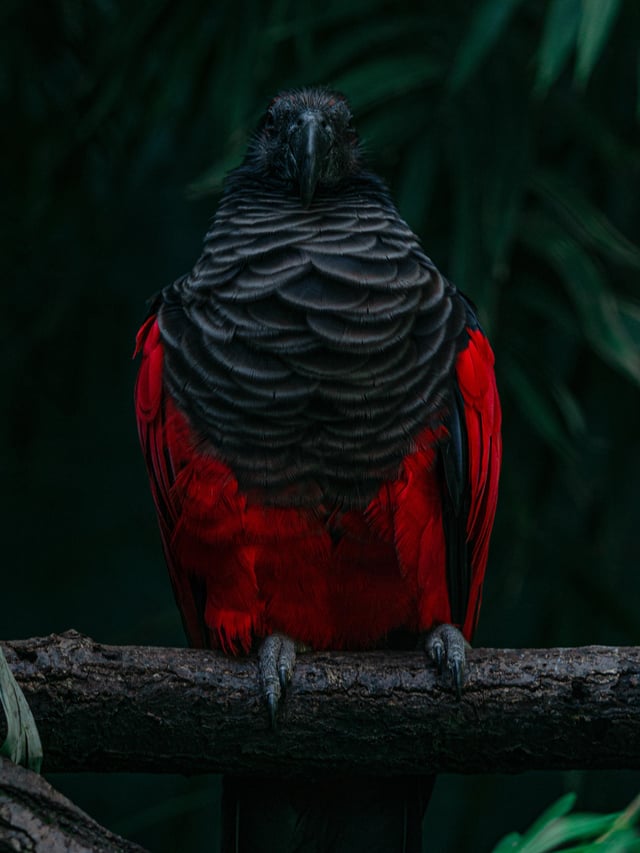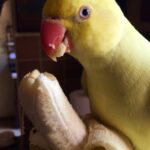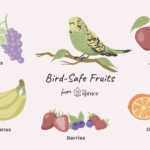No, you cannot legally own a Dracula Parrot. These birds are protected under wildlife conservation laws.
The Dracula Parrot, scientifically known as Pesquet’s Parrot, is a rare and striking bird native to New Guinea. Its unique appearance, featuring a vulture-like head and bright red and black plumage, makes it highly sought after. Despite its appeal, owning one as a pet is illegal due to strict wildlife protection regulations.
These laws aim to preserve the species, which faces threats from habitat loss and hunting. Instead of seeking to own one, consider supporting conservation efforts to protect these magnificent creatures in their natural habitat. Raising awareness about their plight can help ensure their survival for future generations.
Introduction To Dracula Parrots
The Dracula Parrot, also known as the Pesquet’s Parrot, is a striking bird. Its unique appearance and intriguing behaviors make it a fascinating subject. Bird enthusiasts often wonder if they can own this exotic creature. Let’s dive into the world of Dracula Parrots.
Unique Characteristics
Dracula Parrots have a distinctive look. Their body feathers are mostly black. They also have bright red patches on their chest and wings. This striking contrast gives them their unique name.
These birds have a short, hooked beak. This helps them feed on their favorite fruits. Their bare, vulture-like head is another unique feature. It prevents feathers from getting messy while feeding.
Here are some key characteristics:
- Size: About 46 cm in length
- Weight: Around 680-800 grams
- Lifespan: Up to 20 years in the wild
Natural Habitat
Dracula Parrots are native to New Guinea. They thrive in the island’s dense rainforests. These forests provide ample food and shelter. They prefer elevations between 600 and 1200 meters.
The parrots are often seen in small groups. They move through the forest canopy in search of food. Their diet mainly consists of figs and other fruits. They play a crucial role in seed dispersal.
Here are some aspects of their habitat:
| Habitat | Description |
|---|---|
| Location | New Guinea’s rainforests |
| Elevation | 600-1200 meters |
| Diet | Figs and fruits |
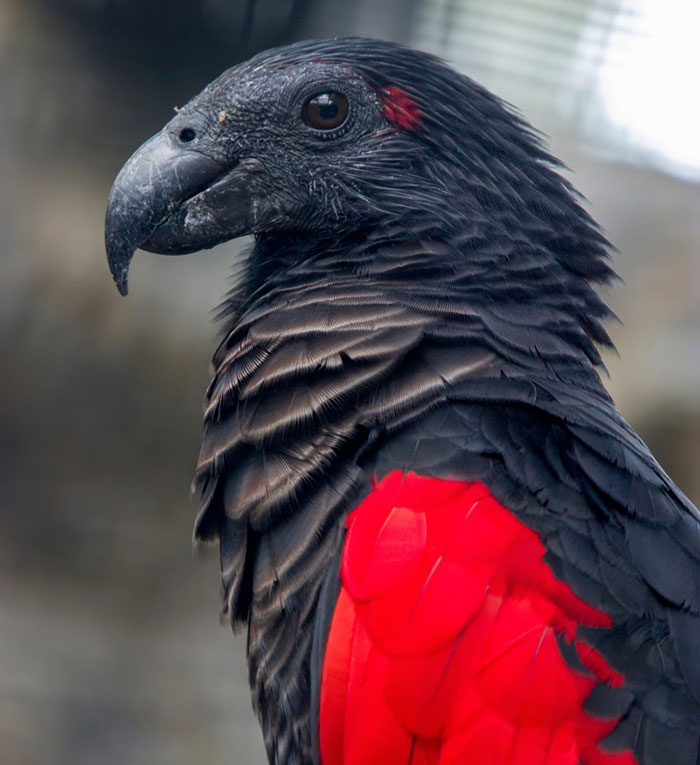
Credit: www.boredpanda.com
Legal Aspects Of Ownership
Owning a Dracula Parrot can be exciting. But it’s important to know the legal aspects. Understanding both international and local laws is crucial.
International Regulations
The Dracula Parrot is a rare bird. It is protected under international laws. The Convention on International Trade in Endangered Species (CITES) governs its trade. This bird falls under Appendix II of CITES.
Countries must follow CITES rules. They need permits to trade these birds. Without proper documentation, owning one is illegal. This helps protect endangered species from extinction.
Local Laws
Local laws vary by country and state. Some places ban owning exotic birds. Others may allow it with permits. Check your local wildlife regulations.
Here’s a quick checklist:
- Contact local wildlife authorities.
- Check for specific permits.
- Ensure compliance with housing and care standards.
Ignorance of the law is not an excuse. Always stay informed and compliant.
Obtaining A Dracula Parrot
Owning a Dracula Parrot can be an exciting idea. These birds are rare and beautiful. But obtaining one requires careful consideration. Below, we discuss trusted sources and ethical considerations.
Trusted Sources
Finding a Dracula Parrot from trusted sources is crucial. Trusted breeders ensure healthy and well-cared-for birds. They provide necessary documents and health records.
Here are a few things to check:
- Breeder’s reputation
- Health certificates
- Proper permits
Some breeders may be listed online. Always verify their credentials. Avoid sellers without proper documentation.
Ethical Considerations
Owning a Dracula Parrot involves ethical considerations. These birds are wild and need special care.
Consider the following ethical points:
- Conservation status
- Habitat requirements
- Legal regulations
Dracula Parrots need a large space to fly. They also need social interaction. Keeping them in small cages is cruel.
Before buying, ensure you can meet their needs. Research their diet and behavior. Consult with an avian vet for guidance.
| Ethical Point | Importance |
|---|---|
| Conservation Status | High |
| Habitat Requirements | High |
| Legal Regulations | Medium |
Make sure your actions do not harm the species. Keeping these birds demands responsibility and care.
Housing Requirements
To own a Dracula Parrot, you need to know its housing needs. Proper housing ensures the bird’s health and happiness.
Cage Size And Setup
The cage for a Dracula Parrot should be spacious. A minimum size of 36x24x48 inches is recommended. The bars should be strong and spaced no more than 3/4 inch apart.
Place perches at different heights to mimic their natural habitat. Use natural wood perches for their feet. Avoid plastic ones as they can cause discomfort.
The cage should have multiple feeding and water dishes. This helps in easy access to food and water. Clean these dishes daily to ensure hygiene.
| Item | Details |
|---|---|
| Cage Size | 36x24x48 inches |
| Bar Spacing | 3/4 inch apart |
| Perches | Natural wood, various heights |
| Feeding Dishes | Multiple, cleaned daily |
Environmental Enrichment
Dracula Parrots need stimulation to stay happy. Provide plenty of toys. Use a mix of chewable and interactive toys.
Rotate the toys weekly to keep the parrot engaged. This prevents boredom and encourages mental activity.
Offer branches and leaves for foraging. This mimics their natural environment. You can also hide treats in toys for added fun.
- Chewable toys
- Interactive toys
- Branches and leaves
- Treats hidden in toys
Ensure the cage is in a quiet and safe place. Avoid placing it in direct sunlight or drafty areas. A consistent routine helps in maintaining their well-being.
Diet And Nutrition
Understanding the diet and nutrition of a Dracula Parrot is essential for its health. These parrots have specific dietary needs that must be met. Let’s explore what they eat in the wild and what supplements and treats can be given.
Natural Diet
In their natural habitat, Dracula Parrots have a unique diet. They primarily feed on figs, fruits, and nectar. Here is a detailed table of their natural diet:
| Food | Description |
|---|---|
| Figs | Rich in vitamins and minerals |
| Fruits | Provide essential sugars and nutrients |
| Nectar | Source of energy and hydration |
These foods ensure that the parrot stays healthy and vibrant. Providing a similar diet in captivity is crucial.
Supplements And Treats
To maintain optimal health, supplements and treats can be beneficial. Here are some recommended supplements:
- Calcium: Supports bone health
- Multivitamins: Ensure all-round nutrition
- Probiotics: Aid in digestion
Treats can be used for training and bonding. Suitable treats include:
- Seeds: High in essential fats
- Nuts: Provide protein and healthy fats
- Dried Fruits: Offer natural sweetness
Ensuring a balanced diet with these supplements and treats will keep your Dracula Parrot healthy and happy.
Health And Veterinary Care
Owning a Dracula Parrot comes with unique challenges. These exotic birds need special care to stay healthy. Understanding their health needs is important for any owner.
Common Health Issues
Dracula Parrots are prone to several health issues. Knowing these can help you provide better care.
- Respiratory Infections: These birds are sensitive to cold weather. Keep them in a warm environment.
- Feather Plucking: Stress or poor nutrition can cause feather plucking. Ensure a balanced diet.
- Parasitic Infections: Regular check-ups can help detect and treat parasites.
Finding An Avian Vet
Locating a vet for a Dracula Parrot can be tricky. Specialized avian vets know how to handle these birds.
- Search online for avian vets in your area.
- Check reviews and ratings.
- Contact local bird clubs for recommendations.
Regular visits to an avian vet ensure your parrot stays healthy. Prevention is always better than treatment.
Behavior And Socialization
The Dracula Parrot, also known as the Pesquet’s Parrot, is a fascinating bird. It has unique behaviors and socialization needs. Understanding its nature helps in creating a healthy environment for them.
Interaction With Humans
Dracula Parrots are intelligent and curious birds. They can form bonds with humans. They enjoy spending time with their owners. Regular interaction is essential for their mental health. These birds can be quite vocal. They use sounds to express their feelings.
They need plenty of social interaction. Lack of interaction can lead to boredom. This can result in destructive behaviors. Ensure you spend quality time with your parrot daily. Engage them with toys and activities.
Training Tips
Training a Dracula Parrot can be rewarding. Start with simple commands like “step up” and “step down”. Use positive reinforcement techniques. Treats and praise work well. Consistency is key to effective training.
Use short training sessions to keep their attention. Gradually increase the complexity of the commands. Patience is crucial. Never use negative reinforcement. This can damage the trust between you and your parrot.
Below are some training tips for Dracula Parrots:
- Use Positive Reinforcement: Always reward good behavior.
- Be Consistent: Regular training sessions are important.
- Keep Sessions Short: Parrots have short attention spans.
- Use Treats and Praise: Reinforce positive actions.
- Avoid Negative Reinforcement: It can harm your bond.
Training helps in building a strong bond with your parrot. It also keeps them mentally stimulated.
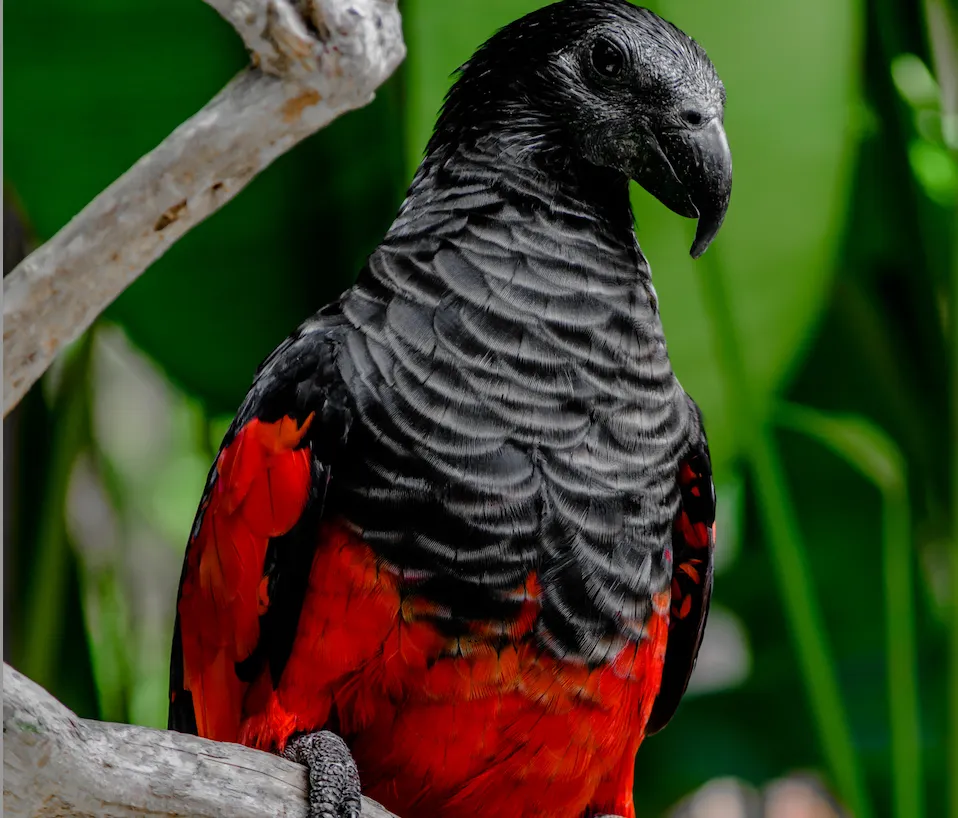
Credit: www.discoverwildlife.com
Challenges And Rewards
Owning a Dracula Parrot comes with unique challenges and rewards. These majestic birds require special care and attention. Understanding these aspects will help you decide if you can own one.
Time Commitment
Dracula Parrots need a lot of time from their owners. They require daily interaction and care. Expect to spend at least 2 hours a day with them. Grooming, feeding, and cleaning are daily tasks. If you travel often, this bird may not be for you. They also need mental stimulation and physical exercise.
Emotional Bonding
Dracula Parrots form strong emotional bonds with their owners. They are affectionate and enjoy being around people. This bond requires consistent and positive interaction. Neglect can lead to behavioral issues. They are known to be sensitive and need a stable environment. Positive reinforcement works well during training sessions.

Credit: www.reddit.com
Conclusion
Owning a Dracula Parrot is challenging due to strict regulations. They thrive best in their natural habitats. Research and understand their needs before considering. Ensure you meet legal requirements and ethical standards. Protecting these unique birds helps preserve biodiversity. Always prioritize their well-being and conservation efforts.
Ryan Everhart is a passionate bird enthusiast and blogger, primarily writing on his website, Avian Whispers. His journey into the world of bird blogging began with a deep interest in parrots, a species that captivated his attention for their intelligence and social behavior. Over time, his content expanded to cover a broader range of bird species, offering insights into bird behavior, care, habitats, and conservation.
Ryan is dedicated to educating his audience, which includes both new bird owners and seasoned enthusiasts. His writing is filled with personal experiences, expert knowledge, and practical advice on bird care. Through Avian Whispers, he aims to foster a deeper appreciation for birds, emphasizing their role in nature and the joys of having them as pets.
Starting with articles focused on parrots, Ryan’s work now encompasses a diverse range of topics such as feeding, training, habitat enrichment, and bird health. His love for birds extends beyond parrots, diving into various avian species. His informative and heartfelt writing reflects his commitment to the well-being of birds and the desire to help others connect with these creatures.
As a growing voice in the bird blogging community, Ryan strives to provide a platform where bird lovers can learn, share experiences, and connect over a shared passion for avian life. His blogs are not only educational but also serve as a reminder of the importance of protecting and nurturing the bond between humans and birds.

